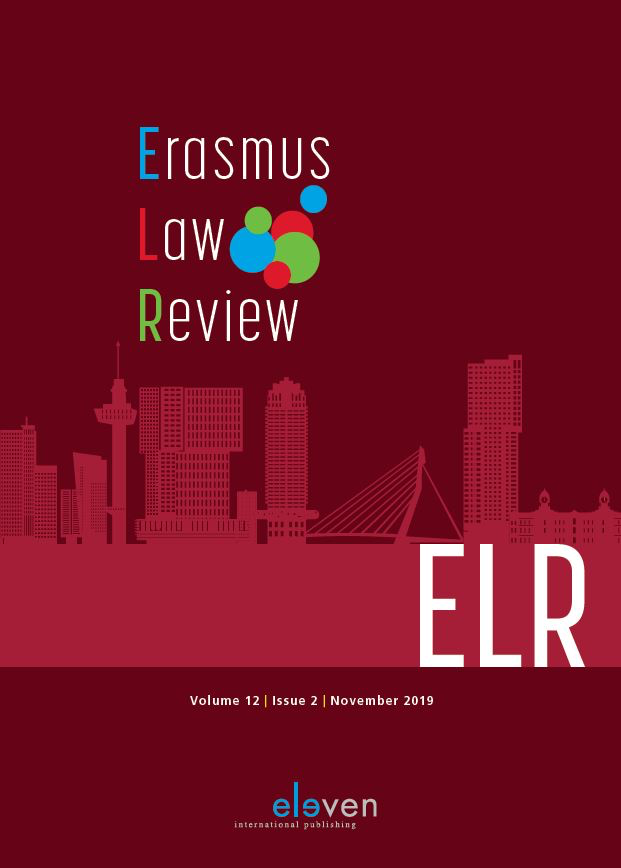|
The article takes as its point of departure some of the author’s multidisciplinary projects. Special attention is given to the question of whether the disciplines united in the various research team members already constituted a kind of ‘inter-discipline’, through which a single object was studied. The issue of how the disciplinary orientations of the research team members occasionally clashed, on methodological issues, is also addressed. |


Erasmus Law Review
Over dit tijdschriftMeld u zich hier aan voor de attendering op dit tijdschrift zodat u direct een mail ontvangt als er een nieuw digitaal nummer is verschenen en u de artikelen online kunt lezen.
| Editorial |
|
| Auteurs | Sanne Taekema en Wibren van der Burg |
| Auteursinformatie |
| Article |
|
| Auteurs | Andria Naudé Fourie |
| SamenvattingAuteursinformatie |
|
There is a distinct place for legal doctrinal methods in legal-interdisciplinary research methodologies, but there is value to be had in expounding that place – in developing a deeper understanding, for instance, of what legal doctrinal analysis has to offer, wherein lies its limitations, and how it could work in concert with methods and theories from disciplinary areas other than law. This article offers such perspectives, based on experiences with an ‘advanced’ legal-interdisciplinary methodology, which facilitates a long-term study of the growing body of practice generated by citizen-driven, independent accountability mechanisms (IAMs) that are institutionally affiliated with multilateral development banks. The article demonstrates how legal doctrinal methods have contributed towards the design and development of a multipurpose IAM-practice database. This database constitutes the analytical platform of the research project and also facilitates the integration of various types of research questions, methods and theories. |
|
This article sets out to contribute to the special issue devoted to multi-disciplinary legal research by discussing first the limits of purely doctrinal legal research in relation to a particular topic and second the relevant considerations in devising research that (inter alia) draws on non-legal, auxiliary disciplines to ‘fill in’ and guide the legal framework. The topic concerned is the (analysis of the) fundamental rights of minorities. |
| Article |
|
| Auteurs | Harm Kloosterhuis |
| SamenvattingAuteursinformatie |
|
In this article, I want to show that some doctrinal problems of legal interpretation and argumentation can be analysed in a more precise way than a standard doctrinal analysis, when we use insights from speech act theory and argumentation theory. Taking a discussion about the accusation of the criminal act insulting as a starting point, I will try to show that the doctrinal perspective on meaning of statutory norms and of the qualification of utterances as legal acts lacks the instruments to explain why discussions about these meanings and utterances are so complicated. In short, a doctrinal analysis focuses on word or sentence meaning, distinguishing between the literal or semantic meaning on the one hand and the meaning in context on the other. However, the analysis of this ‘meaning in context’ is often rather vague, especially in cases of indirect and strategic communication. It is the analysis of this meaning in context that can profit from insights from speech act theory. I do not want to ‘solve’ the problems of the interpretation of the norms concerning insulting. I only use this case in point as an exemplary example to discuss important (often implicit doctrinal) starting points about the related concepts meaning and intention (or commitment) in interpretative discussions. |
| Article |
|
| Auteurs | Terry Hutchinson |
| SamenvattingAuteursinformatie |
|
The doctrinal methodology is in a period of change and transition. Realising that the scope of the doctrinal method is too constricting, academic lawyers are becoming eclectic in their use of research method. In this transitional time, legal scholars are increasingly infusing evidence (and methods) from other disciplines into their reasoning to bolster their reform recommendations. |

 Aflevering 4
Aflevering 4